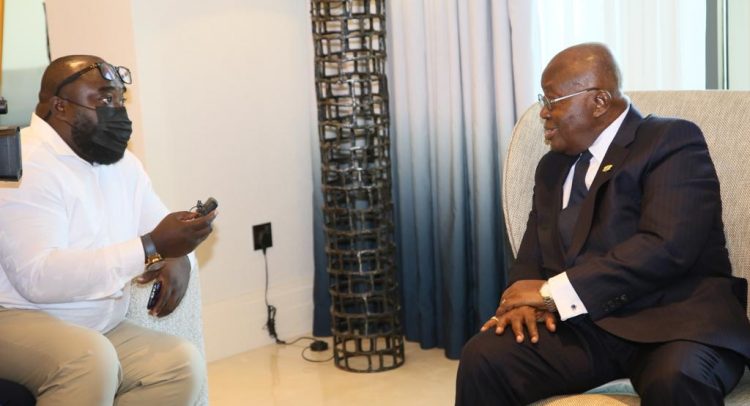Daily Guide’s Charles Takyi Boadu and the President during the interview
President Akufo-Addo has waded into the NDC’s agitation over the Supreme Court ruling on the issue of the voting rights of the Deputy Speakers, saying that the unanimous decision last Wednesday should put the matter to rest.
He expressed surprise that the matter took the heated turn witnessed recently.
In an interview with Charles Takyi Boadu of the DAILY GUIDE newspaper on Thursday, on the sidelines of the Dubai Expo 2020, the President stated, “As far as I can see it, and I think the Supreme Court has confirmed it, the matters involved in this are open and shut, they are black and white. There can be no dispute about the issues that the gentleman took to the Supreme Court.”
He indicated that Articles 102 and 104 of the Constitution make it absolutely clear, “in black and white,” that the Deputy Speakers, when they are presiding, have the right to participate in the vote of Parliament.
“Indeed, and I believe that is part of the reasoning of the court, all the legislatures of the world, where the presiding person is a member of the legislature, like our Deputy Speakers are, like the Speaker of the House of Representatives in the United States of America or the President pro tempore of the Senate in the United States, or the Speaker of the British Parliament, have the right to speak because they are Members of the Assembly,” President Akufo-Addo said.
He continued, “Our Speaker is expressly not a Member of the Assembly, that is why he doesn’t have the right to vote. In fact, he really ought not to participate in the deliberations of the House, he is a referee making sure that the debate is conducted properly, or the orders of the House are complied with. That is his role. But he ought, strictly speaking, not to be part of the proceedings of the House. That is not the case with the Deputy Speakers, and that matter is transparent on the face of our Constitution.”
The President noted that even the presiding members in the country’s district assemblies have the right to vote, because they are members of the assembly.
“Once you’re a member of the assembly, and you’re representing certain constituencies, if you are denied your right to vote, it is tantamount to denying the right of the people you represent to have a say in the decisions of the assembly,” he added.
Constitutional Matters
With this being the first time President Akufo-Addo has commented on a ruling of the court, he stated that he has made deliberate efforts, as much as possible, not to comment on constitutional issues in the country.
“People who are students of our constitutional law, our constitutional jurisprudence, are very much aware of the role that I played when I was a barrister in helping to define some of its basic rules of interpretation. I think now that I have become President, if every time there is a constitutional matter, I’m heard to pronounce on it, it will give the impression that I am setting myself up as some ‘rival Supreme Court’. I am very reluctant to do that, for that reason,” he said.
The suggestion that Parliament is beyond the scrutiny of the Supreme Court, he said, is to suggest that Parliament is a law onto itself.
“I’m not sure people who are saying this have actually taken the time to read the constitution of our country. It says so in black and white. The legislative powers of the state, which is vested in Parliament, is subject to the provisions of the constitution. All organs of the Ghanaian state, including me, as the Head of the Executive, we are all subject to the teachings of the constitution,” the President said.
He added, “There is nobody in the Ghanaian state that is above the fundamental law of the land. It will lead to the very matter that we have striven so long to avoid – the concentration of unregulated power in our state – we don’t want that. And we brought about this constitution to allow that to not reoccur.”
BY Charles Takyi Boadu


